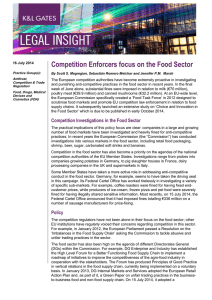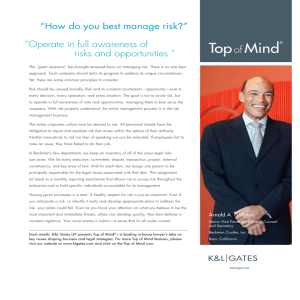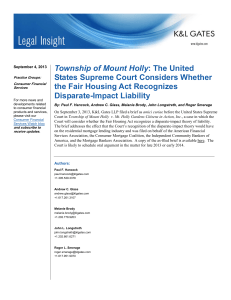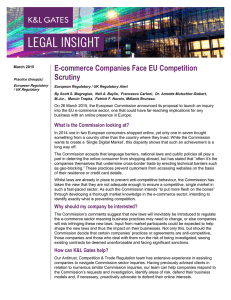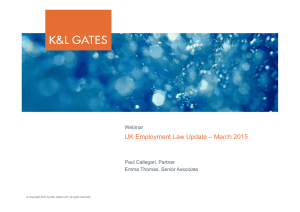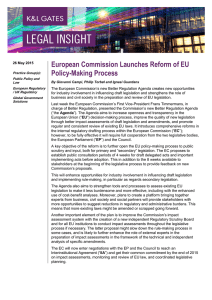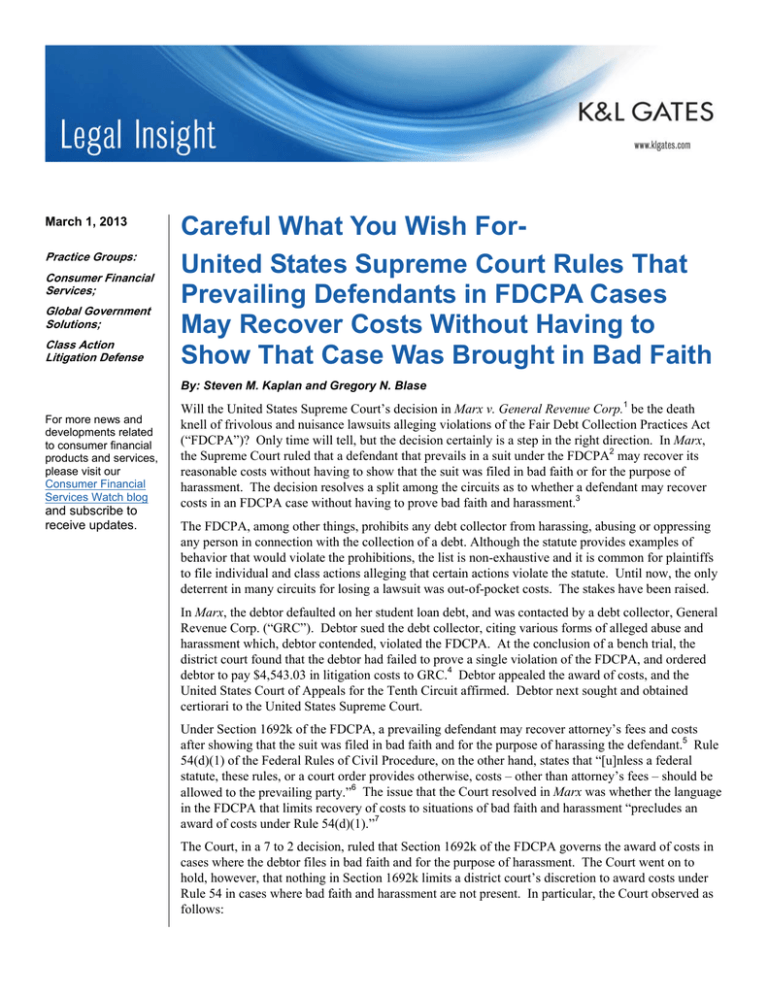
March 1, 2013
Practice Groups:
Consumer Financial
Services;
Global Government
Solutions;
Class Action
Litigation Defense
Careful What You Wish ForUnited States Supreme Court Rules That
Prevailing Defendants in FDCPA Cases
May Recover Costs Without Having to
Show That Case Was Brought in Bad Faith
By: Steven M. Kaplan and Gregory N. Blase
For more news and
developments related
to consumer financial
products and services,
please visit our
Consumer Financial
Services Watch blog
and subscribe to
receive updates.
Will the United States Supreme Court’s decision in Marx v. General Revenue Corp.1 be the death
knell of frivolous and nuisance lawsuits alleging violations of the Fair Debt Collection Practices Act
(“FDCPA”)? Only time will tell, but the decision certainly is a step in the right direction. In Marx,
the Supreme Court ruled that a defendant that prevails in a suit under the FDCPA2 may recover its
reasonable costs without having to show that the suit was filed in bad faith or for the purpose of
harassment. The decision resolves a split among the circuits as to whether a defendant may recover
costs in an FDCPA case without having to prove bad faith and harassment.3
The FDCPA, among other things, prohibits any debt collector from harassing, abusing or oppressing
any person in connection with the collection of a debt. Although the statute provides examples of
behavior that would violate the prohibitions, the list is non-exhaustive and it is common for plaintiffs
to file individual and class actions alleging that certain actions violate the statute. Until now, the only
deterrent in many circuits for losing a lawsuit was out-of-pocket costs. The stakes have been raised.
In Marx, the debtor defaulted on her student loan debt, and was contacted by a debt collector, General
Revenue Corp. (“GRC”). Debtor sued the debt collector, citing various forms of alleged abuse and
harassment which, debtor contended, violated the FDCPA. At the conclusion of a bench trial, the
district court found that the debtor had failed to prove a single violation of the FDCPA, and ordered
debtor to pay $4,543.03 in litigation costs to GRC.4 Debtor appealed the award of costs, and the
United States Court of Appeals for the Tenth Circuit affirmed. Debtor next sought and obtained
certiorari to the United States Supreme Court.
Under Section 1692k of the FDCPA, a prevailing defendant may recover attorney’s fees and costs
after showing that the suit was filed in bad faith and for the purpose of harassing the defendant.5 Rule
54(d)(1) of the Federal Rules of Civil Procedure, on the other hand, states that “[u]nless a federal
statute, these rules, or a court order provides otherwise, costs – other than attorney’s fees – should be
allowed to the prevailing party.”6 The issue that the Court resolved in Marx was whether the language
in the FDCPA that limits recovery of costs to situations of bad faith and harassment “precludes an
award of costs under Rule 54(d)(1).”7
The Court, in a 7 to 2 decision, ruled that Section 1692k of the FDCPA governs the award of costs in
cases where the debtor files in bad faith and for the purpose of harassment. The Court went on to
hold, however, that nothing in Section 1692k limits a district court’s discretion to award costs under
Rule 54 in cases where bad faith and harassment are not present. In particular, the Court observed as
follows:
Careful What You Wish ForUnited States Supreme Court Rules That Prevailing
Defendants in FDCPA Cases May Recover Costs Without
Having to Show That Case Was Brought in Bad Faith
Congress intended [Section]1692k(a)(3) to deter plaintiffs
from bringing nuisance lawsuits. It, therefore, expressly
provided that when plaintiffs bring an action in bad faith
and for the purpose of harassment, the court may award
attorney’s fees and costs to the defendant. The statute does
address this type of case — i.e., cases in which the plaintiff
brings the action in bad faith and for the purpose of
harassment. But it is silent where bad faith and purpose of
harassment are absent, and silence does not displace the
background rule that a court has discretion to award costs.8
In reaching this conclusion, the Court rejected debtor’s argument that the FDCPA’s “allowance of
costs creates a negative implication that costs are unavailable in any other circumstances.”9 The Court
noted that a negative implication may not be drawn “unless it is fair to suppose that Congress
considered the unnamed possibility and meant to say no to it.”10 And, as the Court reasoned, “[h]ad
Congress intended the second sentence of [Section]1692k(a)(3) to displace Rule 54(d)(1), it could
have easily done so by using the word ‘only’ before setting forth the condition ‘[o]n a finding by the
court that an action . . . was brought in bad faith and for the purpose of harassment . . . .’”11
While the Court’s ruling addressed the award of litigation costs – and not attorney’s fees – it may
nevertheless have far-ranging implications for suits under the FDCPA. Attorney’s fees are usually the
greatest expense in litigation, but costs associated with a lawsuit can also be high. This is particularly
true in the context of a class action that involves extensive discovery, depositions, or the potentially
high cost of notice to a putative class. In a class action, the FDCPA allows for recovery of (a) actual
damages and statutory penalties of up to $1,000 for the named plaintiff; and (b) “the lesser of
$500,000 or 1 per centum of the net worth of the debt collector” for the putative class.12 After Marx,
the amount in costs that a court could potentially award to a prevailing defendant in an FDCPA class
action could approach, if not exceed, the amount that is available for recovery in most class actions.
Even in an individual action, costs may be quite high, relative to the potential recovery. The Marx
case provides an example of this fact. The most a borrower can recover in an individual suit under the
FDCPA is the amount of any actual damages plus statutory penalties of not more than $1,000. Yet, in
Marx, the debtor was ordered to pay more than four times that amount in costs.
The fact that it is now settled that defendants can seek recovery of costs under Rule 54(d) hopefully
will give plaintiff’s counsel pause before filing suit under the FDCPA.
Authors:
Steven M. Kaplan
steve.kaplan@klgates.com
+1.202.778.9204
Gregory N. Blase
gregory.blase@klgates.com
+1.617.951.9059
2
Careful What You Wish ForUnited States Supreme Court Rules That Prevailing
Defendants in FDCPA Cases May Recover Costs Without
Having to Show That Case Was Brought in Bad Faith
1 Case No. 11–1175, 568 U.S. ___ (Feb. 26, 2013).
2
15 U.S.C. §§ 1692, et seq.
3
Prior to the Supreme Court’s ruling in Marx, the Fourth, Sixth, Seventh and Tenth Circuits have ruled that good faith by
the plaintiff in filing suit under the FDCPA, by itself, cannot defeat a request for costs under Fed. R. Civ. P. 54(d)(1).
Teague v. Bakker, 35 F.3d 978, 996 (4th Cir. 1994) (“the mere fact that a suit may have been brought in good faith is
alone insufficient to warrant a denial of costs in favor of a prevailing defendant”); Cherry v. Champion, 186 F.3d 442, 446
(4th Cir. 1999) (“a party’s good faith, standing alone, is an insufficient basis for refusing to assess costs against that
party”); White & White, Inc. v. Am. Hosp. Supply Corp., 786 F.2d 728, 731 (6th Cir. 1986) (“[g]ood faith without more … is
an insufficient basis for denying costs to a prevailing party”); Coyne–Delany v. Capital Dev. Bd. of Ill., 717 F.2d 385, 390
(7th Cir. 1983) (“[t]he losing party’s good faith and proper conduct of the litigation is not enough....”); AeroTech, Inc. v.
Estes, 110 F.3d 1523, 1527 (10th Cir. 1997). The Ninth Circuit has ruled that “[t]he FDCPA’s remedial purpose is served
by interpreting § 1692k(a)(3) as authorizing an award of attorneys’ fees and costs only upon a finding that plaintiff brought
the action in bad faith and for the purpose of harassment.” Rouse v. Law Offices of Rory Clark, 603 F.3d 699, 705 (9th
Cir. 2010).
4
The costs claimed by GRC included witness fees, witness travel expenses, and deposition transcript fees.
5
15 U.S.C. § 1692k(a)(3). The statute states, in relevant part, that “[o]n a finding by the court that an action under this
section was brought in bad faith and for the purpose of harassment, the court may award to the defendant attorney’s fees
reasonable in relation to the work expended and costs.” Id.
6
Fed. R. Civ. P. 54(d)(1).
7
Marx, slip op. at 8 (stating that “[t]he question in this case is not whether costs are allowed under §1692k(a)(3) but
whether §1692k(a)(3) precludes an award of costs under Rule 54(d)(1)”).
8
Marx, slip op. at 8.
9
Id.
10
Id. at 9.
11
Id. at 12.
12
15 U.S.C. § 1692k(a)(2)(B).
3
Consumer Financial Services Practice Contact List
K&L Gates’ Consumer Financial Services practice provides a comprehensive range of transactional,
regulatory compliance, enforcement and litigation services to the lending and settlement service
industry. Our focus includes first- and subordinate-lien, open- and closed-end residential mortgage
loans, as well as multi-family and commercial mortgage loans. We also advise clients on direct and
indirect automobile, and manufactured housing finance relationships. In addition, we handle
unsecured consumer and commercial lending. In all areas, our practice includes traditional and ecommerce applications of current law governing the fields of mortgage banking and consumer
finance.
For more information, please contact one of the professionals listed below.
LAWYERS
Boston
R. Bruce Allensworth
Irene C. Freidel
Stanley V. Ragalevsky
Brian M. Forbes
Andrew Glass
Sean P. Mahoney
Phoebe Winder
Charlotte
John H. Culver III
Amy Pritchard Williams
Chicago
Michael J. Hayes Sr.
Dallas
David Monteiro
Miami
Paul F. Hancock
New York
Elwood F. Collins
Steve H. Epstein
Drew A. Malakoff
Pittsburgh
Melissa J. Tea
San Francisco
Jonathan Jaffe
Elena Grigera Babinecz
Amanda D. Gossai
Seattle
Holly K. Towle
Sydney
Andrea P. Beatty
Daad Soufi
Abhishek Bansal
Washington, D.C.
Costas A. Avrakotos
David L. Beam
Holly Spencer Bunting
Melanie Hibbs Brody
bruce.allensworth@klgates.com
irene.freidel@klgates.com
stan.ragalevsky@klgates.com
brian.forbes@klgates.com
andrew.glass@klgates.com
sean.mahoney@klgates.com
phoebe.winder@klgates.com
+1.617.261.3119
+1.617.951.9154
+1.617.951.9203
+1.617.261.3152
+1.617.261.3107
+1.617.261.3202
+1.617.261.3196
john.culver@klgates.com
amy.williams@klgates.com
+1.704.331.7453
+1.704.331.7429
michael.hayes@klgates.com
+1.312.807.4201
david.monteiro@klgates.com
+1.214.939.5462
paul.hancock@klgates.com
+1.305.539.3378
elwood.collins@klgates.com
steve.epstein@klgates.com
drew.malakoff@klgates.com
+1.212.536.4005
+1.212.536.4830
+1.216.536.4034
melissa.tea@klgates.com
+1.412.355.8385
jonathan.jaffe@klgates.com
elena.babinecz@klgates.com
amanda.gossai@klgates.com
+1.415.249.1023
+1.415.882.8079
+1.415.882.8020
holly.towle@klgates.com
+1.206.370.8334
andrea.beatty@klgates.com
abhishek.bansal@klgates.com
+61.2.9513.2333
+61.2.9513.2300
+61.2.9513.2300
costas.avrakotos@klgates.com
david.beam@klgates.com
holly.bunting@klgates.com
melanie.brody@klgates.com
+1.202.778.9075
+1.202.778.9026
+1.202.778.9853
+1.202.778.9203
4
Consumer Financial Services Practice Contact List
Krista Cooley
Daniel F. C. Crowley
Eric J. Edwardson
Steven M. Kaplan
Phillip John Kardis II
Rebecca H. Laird
Michael J. Missal
Laurence E. Platt
Stephanie C. Robinson
Phillip L. Schulman
David Tallman
Stephen G. Topetzes
Nanci L. Weissgold
Emily J. Booth
Kris D. Kully
Morey E. Barnes Yost
Kathryn M. Baugher
Andrew L. Caplan
Soyong Cho
Shanda N. Hastings
Rebecca Lobenherz
Eric Mitzenmacher
Tori K. Shinohara
Kerri M. Smith
krista.cooley@klgates.com
dan.crowley@klgates.com
eric.edwardson@klgates.com
steven.kaplan@klgates.com
phillip.kardis@klgates.com
rebecca.laird@klgates.com
michael.missal@klgates.com
larry.platt@klgates.com
stephanie.robinson@klgates.com
phil.schulman@klgates.com
david.tallman@klgates.com
stephen.topetzes@klgates.com
nanci.weissgold@klgates.com
emily.booth@klgates.com
kris.kully@klgates.com
morey.barnesyost@klgates.com
kathryn.baugher@klgates.com
andrew.caplan@klgates.com
soyong.cho@klgates.com
shanda.hastings@klgates.com
becky.lobenherz@klgates.com
eric.mitzenmacher@klgates.com
tori.shinohara@klgates.com
kerri.smith@klgates.com
+1.202.778.9257
+1.202.778.9447
+1.202.778.9387
+1.202.778.9204
+1.202.778.9401
+1.202.778.9038
+1.202.778.9302
+1.202.778.9034
+1.202.778.9856
+1.202.778.9027
+1.202.778.9046
+1.202.778.9328
+1.202.778.9314
+1.202.778.9112
+1.202.778.9301
+1.202.778.9215
+1.202.778.9435
+1.202.778.9094
+1.202.778.9181
+1.202.778.9119
+1.202.778.9177
+1.202.778.9127
+1.202.778.9423
+1.202.778.9445
PROFESSIONALS
Government Affairs Advisor / Director of Licensing
Washington, D.C.
Stacey L. Riggin
stacey.riggin@klgates.com
+1.202.778.9202
Regulatory Compliance Analysts
Washington, D.C.
Dameian L. Buncum
Teresa Diaz
Robin L. Gieseke
Brenda R. Kittrell
Dana L. Lopez
Patricia E. Mesa
Daniel B. Pearson
Jeffrey Prost
+1.202.778.9093
+1.202.778.9852
+1.202.778.9481
+1.202.778.9049
+1.202.778.9383
+1.202.778.9199
+1.202.778.9881
+1.202.778.9364
dameian.buncum@klgates.com
teresa.diaz@klgates.com
robin.gieseke@klgates.com
brenda.kittrell@klgates.com
dana.lopez@klgates.com
patty.mesa@klgates.com
daniel.pearson@klgates.com
jeffrey.prost@klgates.com
5
Consumer Financial Services Practice Contact List
Anchorage Austin Beijing Berlin Boston Brisbane Brussels Charleston Charlotte Chicago Dallas Doha Dubai Fort Worth Frankfurt
Harrisburg Hong Kong Houston London Los Angeles Melbourne Miami Milan Moscow Newark New York Orange County Palo Alto Paris
Perth Pittsburgh Portland Raleigh Research Triangle Park San Diego San Francisco São Paulo Seattle Seoul Shanghai Singapore Spokane
Sydney Taipei Tokyo Warsaw Washington, D.C.
K&L Gates practices out of 47 fully integrated offices located in the United States, Asia, Australia, Europe, the
Middle East and South America and represents leading global corporations, growth and middle-market companies,
capital markets participants and entrepreneurs in every major industry group as well as public sector entities,
educational institutions, philanthropic organizations and individuals. For more information about K&L Gates or its
locations, practices and registrations, visit www.klgates.com.
This publication is for informational purposes and does not contain or convey legal advice. The information herein should not be used or relied upon in
regard to any particular facts or circumstances without first consulting a lawyer.
©2013 K&L Gates LLP. All Rights Reserved.
6

